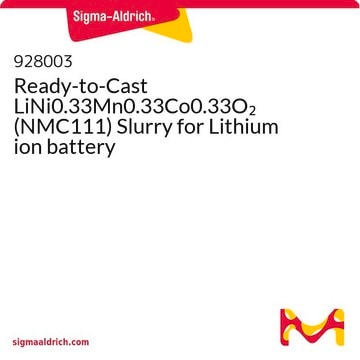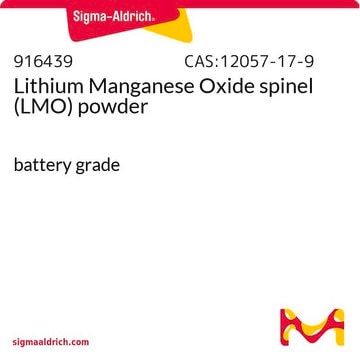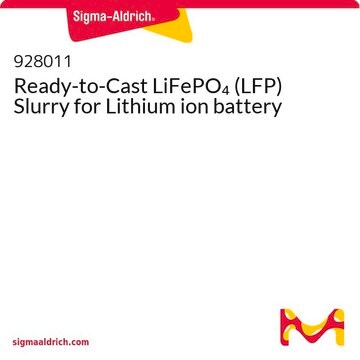765171
Lithium nickel cobalt aluminium oxide
electrode sheet, aluminum substrate, size 5 in. × 10 in.
Synonym(s):
NCA
About This Item
Recommended Products
grade
battery grade
description
Nominal Voltage: 3.7 V, Li/Li+
Assay
≥98%
composition
loading, ≥80%
greener alternative product characteristics
Design for Energy Efficiency
Learn more about the Principles of Green Chemistry.
sustainability
Greener Alternative Product
extent of labeling
≥80% loading
size
5 in. × 10 in.
thickness
12-25 μm
particle size
10-13 μm (typical)
capacity
150 mAh/g(minimum)
180 mAh/g(nominal at 0.1C)
mp
>1000 °C
application(s)
battery manufacturing
greener alternative category
, Enabling
Related Categories
General description
Application
The NCA casted electrode sheets can be cut into appropriate size and is ready to be used in lithium ion batteries.
Other Notes
Operating Condiditons:
- Recommended maximum charge voltage: 4.3 V vs Li/Li+
- Recommended maximum charge current: 4C
- Recommended cut-off voltage for discharge: 3.0 V vs Li/Li+
- Recommended charge method: constant current - constant voltage
Signal Word
Warning
Hazard Statements
Precautionary Statements
Hazard Classifications
Carc. 2 - Skin Sens. 1
Storage Class Code
11 - Combustible Solids
WGK
WGK 3
Flash Point(F)
Not applicable
Flash Point(C)
Not applicable
Certificates of Analysis (COA)
Search for Certificates of Analysis (COA) by entering the products Lot/Batch Number. Lot and Batch Numbers can be found on a product’s label following the words ‘Lot’ or ‘Batch’.
Already Own This Product?
Find documentation for the products that you have recently purchased in the Document Library.
Customers Also Viewed
Articles
Professor Qiao's review explores stable microstructures for lithium metal fluoride batteries, advancing energy storage technologies.
Professor Qiao's review explores stable microstructures for lithium metal fluoride batteries, advancing energy storage technologies.
Professor Qiao's review explores stable microstructures for lithium metal fluoride batteries, advancing energy storage technologies.
Professor Qiao's review explores stable microstructures for lithium metal fluoride batteries, advancing energy storage technologies.
Our team of scientists has experience in all areas of research including Life Science, Material Science, Chemical Synthesis, Chromatography, Analytical and many others.
Contact Technical Service















